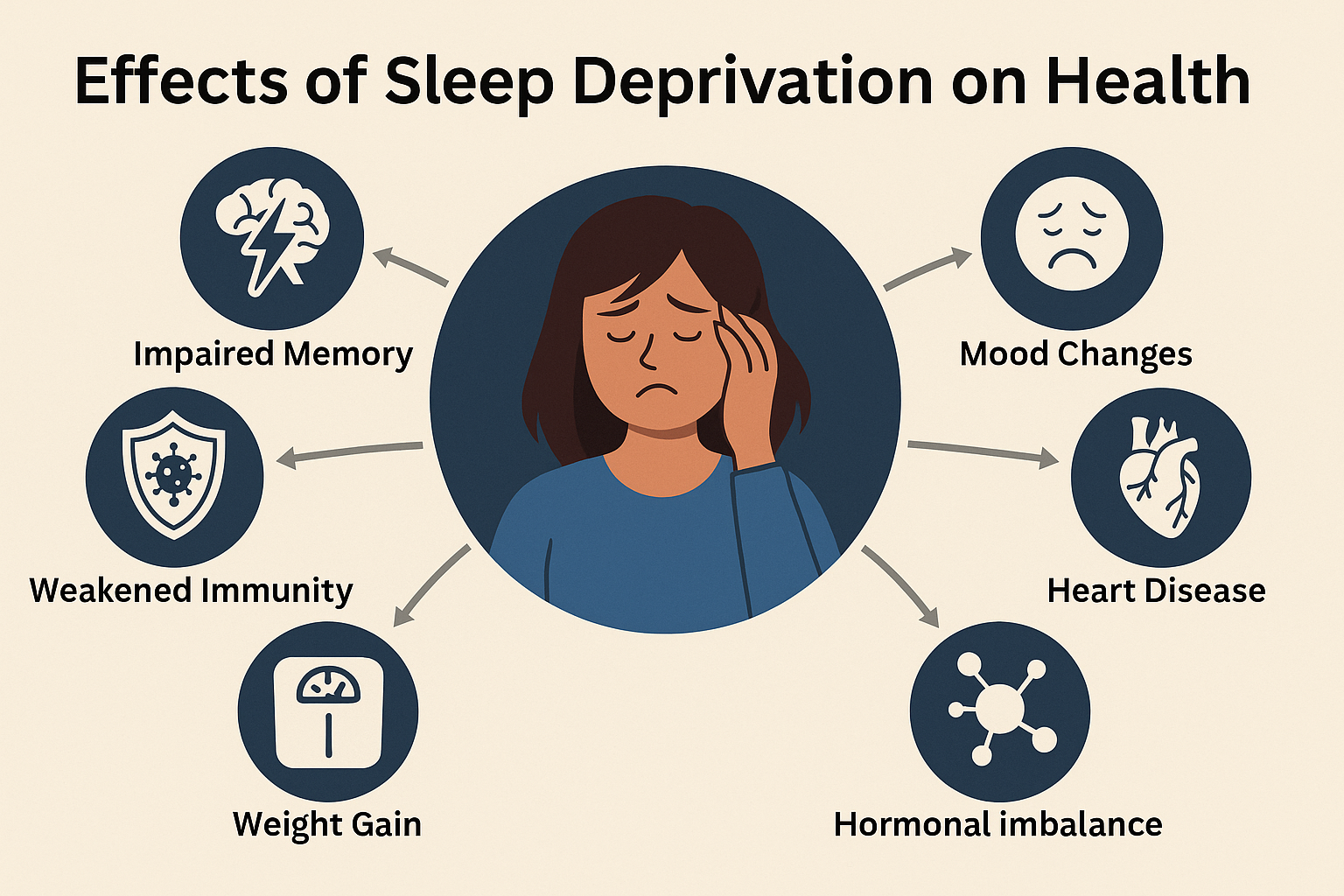
Effects of Sleep Deprivation on Health
Introduction
Sleep is a fundamental pillar of health, influencing every system in the body. While occasional sleepless nights may seem harmless, chronic sleep deprivation can lead to significant health issues. This article delves into how insufficient sleep affects various bodily systems, including mental, hormonal, cardiovascular, immune, and more.
In this article, we’ll explore the wide-ranging effects of sleep deprivation on health — and why quality sleep is not only vital for well-being, but also plays a powerful role in our wealth, productivity, and success.
Effects of Sleep Deprivation on Health
“Sleep deprivation doesn’t just disrupt your routine — it impacts every system in the body and is often called a ‘disease of diseases’.”
🧠 Mental and Cognitive Health
- Mood Disorders: Chronic sleep loss is linked to increased risks of depression, anxiety, and irritability.
- Cognitive Impairment: Lack of sleep impairs attention, alertness, concentration, reasoning, and problem-solving.
- Memory Issues: Sleep plays a crucial role in memory consolidation; deprivation can lead to forgetfulness.
🩺 Cardiovascular Health
- Heart Disease: Sleep deprivation increases the risk of hypertension, heart attack, and stroke.
- Blood Pressure: Insufficient sleep can lead to elevated blood pressure levels.
- Inflammation: Lack of sleep may cause inflammation, contributing to cardiovascular disease.
🧬 Hormonal and Metabolic Health
- Weight Gain: Sleep deprivation affects hormones that control hunger, leading to increased appetite and potential weight gain.
- Diabetes Risk: Chronic sleep loss is associated with impaired glucose tolerance and insulin resistance.
- Hormonal Imbalance: Disrupted sleep affects the balance of hormones like cortisol, leptin, and ghrelin.
🛡️ Immune System Function
- Reduced Immunity: Sleep is vital for immune function; deprivation can weaken the body’s defense against infections.
- Vaccine Efficacy: Lack of sleep may reduce the effectiveness of vaccines.
- Microbiome Disruption: Sleep deprivation can alter gut microbiota, leading to dysbiosis.
- Digestive Issues: Poor sleep is linked to gastrointestinal problems like irritable bowel syndrome (IBS).
🧍 Other Affected Systems
- Skin Health: Insufficient sleep can lead to skin issues like dullness, fine lines, and reduced elasticity.
- Reproductive Health: Sleep deprivation may impact fertility and sexual health.
- Respiratory System: Lack of sleep can exacerbate respiratory diseases like asthma.
💤 Conclusion: Sleep Is Not a Luxury — It’s a Biological Necessity
Sleep deprivation is not just about feeling tired — it’s a silent disruptor of virtually every major system in your body. From foggy thinking and emotional instability to hormonal chaos, weakened immunity, and increased risk of chronic diseases, the effects are far-reaching. Scientific evidence clearly shows that poor sleep quality and quantity compromise your mental clarity, cardiac health, metabolic balance, digestive function, and even your genetic integrity over time.
The good news? Most of these negative outcomes are preventable and reversible with consistent, high-quality sleep. Prioritizing rest is not laziness — it’s foundational self-care. Whether it’s through better sleep hygiene, managing screen time, addressing stress, or treating medical conditions like sleep apnea, taking steps to protect your sleep is a powerful investment in your overall health, longevity, and quality of life.
So tonight, let your body heal. Your future self will thank you. 🌙
❓ Frequently Asked Questions
- Can sleep deprivation cause permanent damage?
- Chronic sleep deprivation can lead to long-term health issues, but many effects are reversible with improved sleep habits.
- How much sleep is considered sufficient?
- Adults typically need 7-9 hours of sleep per night for optimal health.
- Does sleep quality matter as much as quantity?
- Yes, both quality and quantity of sleep are crucial for health.
- Can naps compensate for lost sleep?
- Short naps can help, but they don’t replace the benefits of a full night’s sleep.
- Is it possible to adapt to less sleep over time?
- While some people believe they can function on less sleep, chronic deprivation still poses health risks.
- How does sleep deprivation affect mental health?
- It increases the risk of mood disorders, anxiety, and cognitive impairments.
- Can improving sleep reverse health issues?
- Improved sleep can mitigate many health problems, but some effects may require additional interventions.
- Does sleep deprivation affect children differently?
- Yes, it can impact their growth, development, and academic performance.
- Are there specific foods that promote better sleep?
- Foods rich in magnesium and tryptophan, like nuts and dairy, can aid sleep.
- How does technology use before bed affect sleep?
- Exposure to screens can disrupt melatonin production, making it harder to fall asleep.
